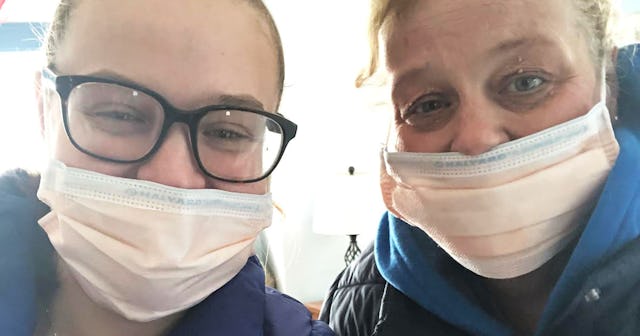Don't Wait Until You're In Crisis To Have The Hard Conversations With Your Parents

When you’re in your teens, you assume your parents are going to live forever. Yeah, they might get a little more grey, have a few more wrinkles, and use language that’s totally out of date.
Even though it was almost two decades ago, I still remember the first time the reality of my parents’ mortality hit me like a ton of bricks. Do you want to be head-to-head or foot-to-foot? Talk about a random, incredibly morbid conversation to walk in on about their final wishes. I couldn’t tell you what they decided, but 16 years later, I sure wish I would have known. In 2019, my mom almost lost her battle with cancer. My dad was a wreck, and I was the oldest of four siblings, so I did what no one else wanted to do: had the hard conversations.
Emotions are running high. Everyone will be stressed out and navigating the crisis and diagnosis differently. So be sure all parties involved have grace with each other, and themselves. One way to avoid some of this heartbreak is to have these conversations before you’re in the middle of the worst-case scenario.
Trust me, I lived it. For about six months, which I swear lasted at least six years, many things were up in the air about my mom’s health and recovery. Yes, thank the Lord (or whoever you thank for miracles), she is still with us today.
Because of such a sudden onset and unexpected diagnosis, many of the hard conversations were had not within the first few months or even the first few weeks. We found ourselves discussing power of attorney and do not resuscitate orders (should it come to that) within the first few days.
As hard as it might be, here are a few things to discuss with your loved ones before you find yourself in the middle of tragic or unexpected events. Rest easy knowing it’s all taken care of. All you have to do is deal with the situation at hand and spend time together.
Powers of Attorney: Financial and Medical
Courtesy of Holly Garcia
Everything happened incredibly quickly. Within 12 hours, my mom went from routine blood work to being admitted for inpatient testing and treatment. The end result was a Stage IV CNS Lymphoma diagnosis.
This type of diagnosis meant cancerous cells had invaded her spinal cord and brain. From the time she went in for her blood work to the time I left her and my father in her hospital room that night, she’d lost the ability to feed herself or speak.
Medically speaking, my family and I knew we would do everything in our power to keep her with us. But could we assume she would feel the same way? Most importantly, we didn’t want her to be in pain.
When it came down to it, who would be authorized to make that call? Who the hell would even want the weight of making that call on their shoulders? Even though he was beside himself, my dad became her Medical POA, but if for some reason he was unable, I was next in line. Talk about some incredibly heavy responsibility.
Being a financial POA felt a little less intense. Having some sense of control in a crisis that was otherwise out of my hands reassured me. Although all their accounts were joint, my dad (God bless him) had no idea what their financials entailed. He was also in no state to make the phone calls that needed to be made to find out how much was due and when. This way, I was able to help with their banking and bill paying while my dad attended to my mom’s most immediate needs.
I need you to know that yes, even though financial and medical are both Power of Attorney documents, they grant different powers for different situations and can’t be interchanged.
“Do Not Resuscitate” Wishes and Palliative Care Options
If y’all thought that was heavy, grab a box of tissues for this next conversation. About three days after this whirlwind of events began, and my mom regained her ability to speak (thanks to an incredible oncology team and steroids), we then had to ask her, “If something happens and they need to pull out the paddles or put you on a ventilator, what do you want?”
No matter what she said, my heart was broken. It felt that way because, at that moment, any answer would validate the fact that whether it be today or 25 years from now, eventually, I would lose my mom.
For the six months that were constantly touch-and-go, I can’t begin to count how many times the emergency response team was called. Whenever Mom’s stats would drop, or she would become non-responsive, the ERT would rush her back to the ICU, we’d only left a day or two earlier. To say we lived in a constant state of crisis is no exaggeration.
Hear me, and hear me now. The last thing you should have to deal with in a crisis is making impossible decisions for someone you love with all your heart. Have the conversations now. It will give you peace of mind to know whatever direction you give it is the right choice because it was their choice.
These aren’t just conversations to have with your parents or other aging people in your life — they apply to your own decisions too. As much as we’d all like to think we’re immortal, accidents do happen. As a wise woman once told me, we all eventually have a check-out date.
Having these conversations before you’re in crisis will save you lots of heartache and many tears. It won’t change the situation you’re faced with, but it relieves stresses you hadn’t considered before. Most importantly, it will allow you to focus your energy on your loved one.
This article was originally published on